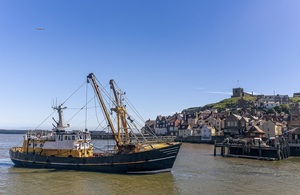UK: £24 million for cutting-edge science and fisheries
UK government announces first investment from £100 million UK Seafood Fund to boost innovation in the fishing industry.
Fishing businesses across the UK will now have access to £24 million of investment to develop technology, trial new gear and support world-class research to improve the productivity and long-term sustainability of the industry.
This comes as the UK industry builds back from the pandemic and benefits from new post Brexit quota arrangements. The UK fleet now has seen significant increases in quota fish stocks such as mackerel and herring. In England, under 10 metre vessels received increased quotas in a range of stocks. This more than doubled the quota they received last year.
The funding released by the Government to support better science and innovation projects is the first part of £100 million UK Seafood Fund designed to level up coastal communities across the UK. It will ensure industry is able to process more fish landed in the UK, and create more job opportunities across the supply chain. It will also upskill the workforce and train new entrants, as well as investing in technology to put the UK at the cutting edge of new safe and sustainable fishing methods.
Environment Secretary, George Eustice, said:
Over the last nine months, we have taken some important steps in the right direction for our fishing industry.
We’ve taken our independent seat at the Regional Fisheries Management Organisations, we have agreed a quota exchange mechanism, and we have seen an uplift in quota for UK vessels.
Now, this major investment will benefit coastal communities up and down the UK. The first investment from our £100M Seafood Fund will boost science and innovation in the fishing industry and, coupled with our Fisheries Act, help us ensure that we have the most sustainable fleet in the world.
Northern Ireland Secretary, Brandon Lewis, said:
The launch of this fund is the first of several brilliant opportunities for the Northern Ireland fisheries industry and will help it to reap the rewards of modernisation.
The UK Seafood Fund will support the sector to advance its practices and to be more productive, resilient and sustainable as we build back better from the pandemic.
Chief Secretary to the Treasury, Steve Barclay, said:
We are committed to making all areas of our economy more sustainable and resilient, and this fund will help to achieve that in the fishing industry. This investment will support the fishing industry and level up coastal communities and create jobs as part of our Plan for Jobs, as well as encourage further innovation in science and technology.
Secretary of State for Wales, Simon Hart, said:
The UK government is committed to supporting the fishing industry in Wales and the £100M Seafood Fund will help ensure it continues to have a sustainable future, contributing to jobs and prosperity in our coastal communities.
UK Government Minister for Scotland David Duguid said:
I know from extensive engagement with the Scottish seafood industry that the £100m UK Seafood Fund has been eagerly anticipated and I welcome the news that the substantial first tranche of funding will boost innovation and all-important sustainability.
The UK Government has been steadfast in support of an industry pivotal to the wellbeing of coastal communities and we are determined all sectors – catching and processing – should be able to maximise the opportunities now before us. I look forward to continuing to work closely with the Scottish seafood and aquaculture sectors to ensure this fresh funding drives the industry to new heights.
To support industry, a Fisheries Industry Science Partnerships scheme will launch today for initial engagement with industry before inviting bids for project funding. The scheme will fund the gathering of new data to sustainably manage the UK’s fish stocks, research new types of fishing gear to boost sustainable fishing, increase confidence in fisheries science, and increase knowledge of the benefits and impacts of fish farming.
Dr Bryce Stewart, Fisheries Biologist and Senior Lecturer at the University of York, said:
I am particularly delighted to see the launch of this scheme for Fisheries Industry Science Partnerships. Our recent research shows that such collaborations are vital for increasing trust and developing more effective and efficient management measures. Ultimately this should lead to more productive fisheries and a healthier marine environment.
The £100 million fund has been divided into three pillars:
The Science and Innovation pillar, launched today, will see the fishing and seafood industry supported to work jointly with scientists to research new types of more productive and sustainable fishing gear, gather new data to more sustainably manage the UK’s fish stocks, and trial projects such as new biodegradable packaging for chilled fish and seafood to reduce single-use plastics. These advancements in science and research will boost efficiency and help to ensure the long term sustainability of the industry.
An Infrastructure pillar, to be announced later in the Autumn, will invest in projects to strengthen the supply chain in the UK, allowing the industry to make the most of increases in quota secured through the Trade and Cooperation Agreement. Potential projects include funding for the modernisation of ports, logistic hubs, freezing facilities, improvements to processing plants and new fish markets.
A further Skills and Training pillar will support career opportunities and upskilling in the sector to ensure the industry has the right skills, capacity, and expertise. This will be a significant boost for training in the industry, which often has lacked formal routes for training and progression.
Further detail on how to bid for funding for both of these schemes will be announced in due course.

